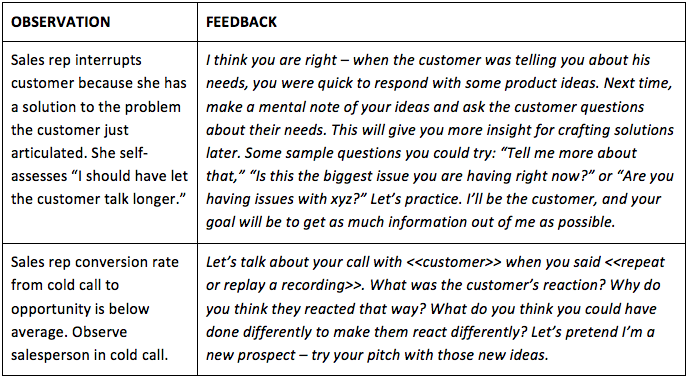Put Me In…I’m Ready to Coach – Part One
- Even a small improvement in sales effectiveness can impacts results. Effective coaching is a low-tech, low cost way to do just that.
- Coaching involves observation, inquiry, communication, practice and reinforcement.
- Sales productivity is driven by efficiency AND effectiveness. Coaching is critical to pushing the effectiveness needle.
Merriam-Webster’s dictionary defines a coach as “one who instructs or trains a player in the fundamentals of a sport and directs the game strategy.” Coaching is an important driver in improving the effectiveness of sales in the field. In a SiriusDecisions benchmark of sales talent, we found that 58 percent of reps rate coaching as extremely or very important. Among top-performing reps, 69 percent stated that input on account strategy was very or extremely important – and 67 percent said that they value individual input on sales skills.
 Ideally, coaching starts with an invitation to the individual to self-assess and includes specific feedback tailored to the individual to make a change. Change occurs when the individual understands what he or she needs to change and is motivated to make the corrections. Two new trends have emerged in the growing focus on coaching sales reps: the automation of sales managers’ coaching efforts, and the creation of a dedicated field coach. However, the implementation of tools and dedicated coaches can be costly.
Ideally, coaching starts with an invitation to the individual to self-assess and includes specific feedback tailored to the individual to make a change. Change occurs when the individual understands what he or she needs to change and is motivated to make the corrections. Two new trends have emerged in the growing focus on coaching sales reps: the automation of sales managers’ coaching efforts, and the creation of a dedicated field coach. However, the implementation of tools and dedicated coaches can be costly.
Organizations that cannot afford these tools should consider defining and selecting a coaching methodology that is rolled out to all sales managers and supported by a management process and culture that reinforces a coaching mindset. Managers of sales managers should inspect to ensure coaching is taking place by holding skip-level meetings to check on impact.
Coaching Practices
Coaching methodologies generally include six essential practices. Here are the first three:
- Observe.To be effective, sales managers need to observe sales reps interacting with customers and determine what they can do to improve the interaction. Identify these improvements specifically. For example: You listen to the sales rep make a cold call. You observe that he or she did not ask probing questions.
- Consider. Consider what you have observed and craft your coaching message. If there is more than one change, select the change that will have a greater impact on the outcome of the activity or requires more coaching to master. For example: The rep didn’t ask probing questions and also didn’t confirm the next step with the client. Both need to be addressed, but the skill of asking probing questions needs more in-depth reinforcement because it’s a harder skill to master.
- Inquire. An effective coaching moment starts with asking the rep how he or she thought the call or interaction went. Ask what he or she observed and get him or her to articulate what could be improved and how. When coaches start with an inquiry, they are driving the rep to learn how to self-assess.

Stay tuned for my next post, where I’ll discuss three other essential elements of coaching B2B sales reps!
